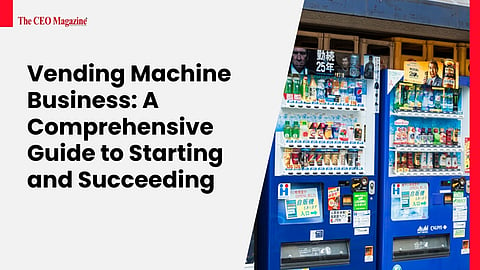
- News
- Women
- Magazine
- IndustryIndustry
- InsightsInsights
- Success Stories
- PublishPublish
- ContactContact
- Media KitMedia Kit

Vending Machine Business: A Comprehensive Guide to Starting and Succeeding
The vending machine business is a growing and profitable venture that offers flexibility, scalability, and low overhead costs. Whether you're looking for a side hustle or a full-time business, vending machines provide an excellent opportunity to generate passive income. With the right strategy and planning, you can tap into the lucrative world of automated retailing.
In this article, we’ll explore the essential steps to start a vending machine business, the potential challenges, and tips to ensure long-term success.
The vending machine industry is worth billions globally, driven by the demand for quick, convenient access to snacks, beverages, and even non-traditional products like electronics and cosmetics. Here are several reasons why it's a good business opportunity:
Low Startup Costs: Compared to other businesses, vending machines require a relatively small initial investment.
Passive Income: Once set up, vending machines generate revenue with minimal ongoing effort.
Scalability: You can start with one or two machines and gradually expand your network based on success.
Flexibility: This business allows you to operate part-time or full-time, depending on your schedule and goals.
Before diving into the vending machine business, it's crucial to research the market and decide which products will best suit your target audience. Some of the most common categories include:
Snacks and Beverages: These are the most popular and widely used vending machine products.
Healthy Foods: With the growing trend toward wellness, healthy food options in vending machines are becoming more in demand.
Specialty Products: Think beyond food. Vending machines offering electronics, hygiene products, or even makeup are gaining popularity in high-traffic areas like airports and malls.
A well-thought-out business plan is key to long-term success. Your plan should outline your target market, initial investment, revenue expectations, and growth strategies. Consider including the following:
Location Strategy: High foot-traffic areas such as offices, schools, gyms, and malls are prime locations for vending machines.
Cost Breakdown: Include the cost of vending machines, inventory, maintenance, and any necessary permits or licenses.
Revenue Projections: Based on your location and product selection, estimate your monthly revenue and break-even point.
Depending on the size and scope of your business, you may need to secure funding. The cost of a new vending machine ranges between $1,500 and $10,000, depending on the machine type and product capacity. If you’re starting small, self-funding or bootstrapping might be sufficient. For larger operations, consider business loans, leasing machines, or seeking investors.
Once you have a business plan and funding in place, it’s time to buy or lease vending machines. There are two main options:
New Machines: Buying new ensures you get the latest technology, including cashless payment options and remote inventory tracking. However, this comes at a higher cost.
Used Machines: Purchasing used vending machines is more affordable but may come with limited warranty and outdated technology.
When selecting machines, ensure they meet the specific needs of your niche. Machines with temperature control are essential for snacks or beverages, while specialized vending machines may be required for unique products.
The location of your vending machines will significantly impact your success. Look for places with high traffic and a clear demand for your products. Some excellent location options include:
Office buildings
Schools and universities
Hospitals and healthcare centers
Gyms and fitness centers
Shopping malls and retail stores
Airports and transportation hubs
Establish agreements with location owners and negotiate a fair commission if necessary. Keep in mind that prime locations may charge a higher rent or commission.
Once you’ve secured your locations and installed your vending machines, stock them with inventory based on customer preferences and demand. Here are some inventory management tips:
Track Sales: Use tracking technology or manual methods to monitor product sales and determine which items perform best.
Restock Regularly: Ensure your machines are never empty by maintaining a regular restocking schedule.
Adjust Inventory: If certain items aren’t selling, replace them with different products to maximize revenue.
Even though vending machines generate passive income, promotion can help you secure more locations and grow your business faster. Utilize social media, local advertising, and networking to raise awareness. Consider setting up a website showcasing your machines, products, and the benefits of having a vending machine at a location.
To keep your vending machines running smoothly, regular maintenance is essential. Service your machines at least once a month to ensure they are clean, functional, and fully stocked. Address technical issues promptly to avoid losing customers and revenue.
Like any business, vending machine operations come with challenges. Common issues include:
Vandalism or Theft: Choose safe, monitored locations, and install security cameras if needed.
Technical Malfunctions: Regular maintenance and investing in newer models with fewer breakdowns can help minimize downtime.
Inventory Management: Use technology to track sales and avoid overstocking or running out of popular items.
To build a thriving vending machine business, follow these success tips:
Diversify Locations: Spread out your vending machines to reduce reliance on one location for income.
Keep Up with Trends: Offer trending or seasonal products to attract more customers.
Provide Multiple Payment Options: Ensure your machines accept cash, credit cards, and mobile payments for convenience.
Analyze Performance: Regularly evaluate the performance of each machine and adjust products and locations accordingly.
The vending machine business offers an accessible and scalable opportunity for aspiring entrepreneurs. By carefully selecting your niche, securing strategic locations, and maintaining high levels of customer service, you can build a profitable and sustainable business. With the growing demand for convenience, the vending machine industry is poised for continued growth, making it an ideal time to get started.
Follow us on Google News
